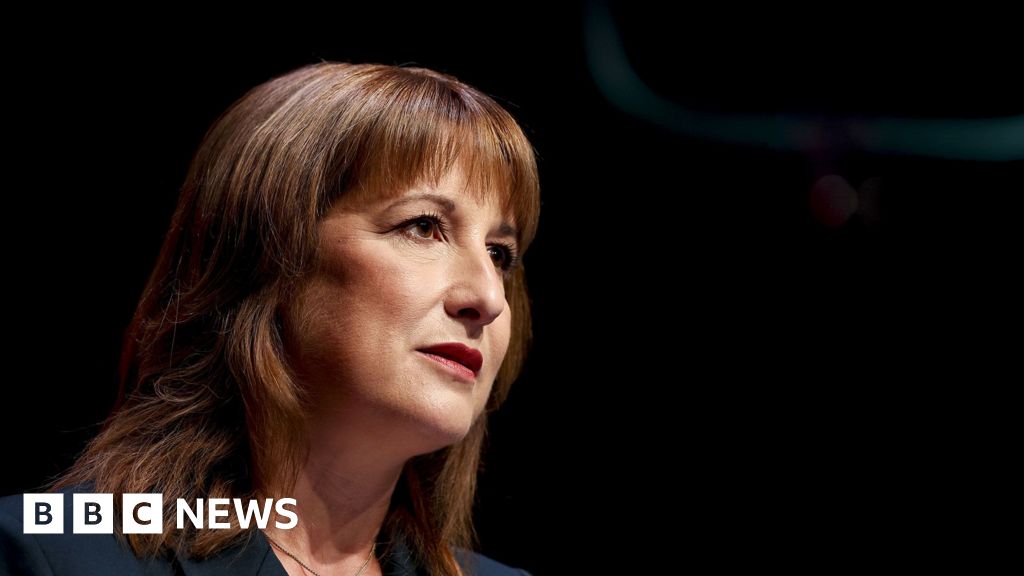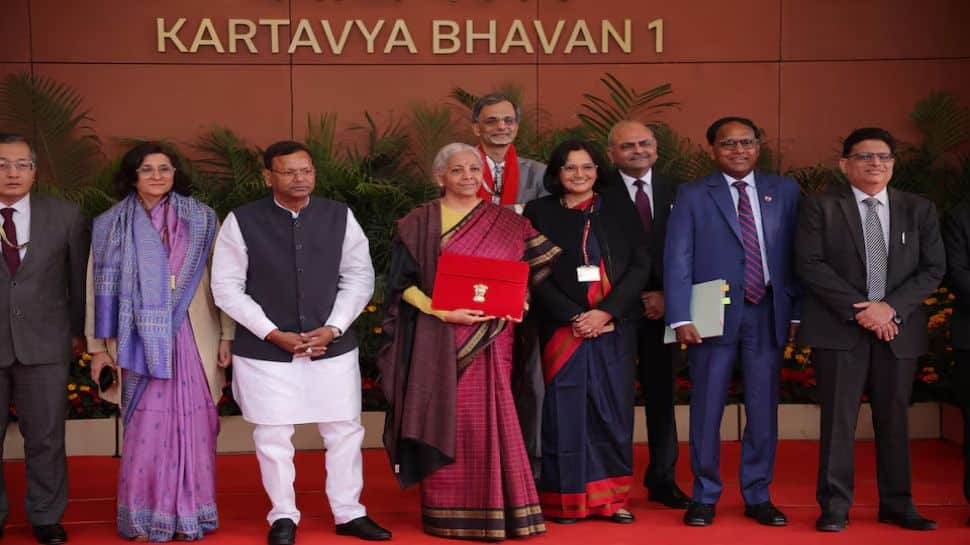Business
Reeves could face £20bn Budget hole as UK productivity downgraded

The government is facing a bigger-than-expected hole in the public finances as it prepares for next month’s Budget.
A downgrade to the UK’s productivity performance from the government’s official forecaster could lead to the chancellor facing a £20bn gap in meeting her tax and spending rules, the BBC understands.
Rachel Reeves has confirmed both tax rises and spending cuts are options in next month’s Budget.
The Treasury declined to comment on “speculation” ahead of the Office for Budget Responsibility’s (OBR) final forecast, which will be published on 26 November alongside the Budget.
It comes as the chancellor told an audience in Saudi Arabia that Brexit is partly to blame for high inflation in the UK.
Persistent higher prices have been a dampener on UK economic growth, because the Bank of England has kept interest rates higher to control inflation, and that has made Reeves’ job harder to balance tax and spending within her fiscal rules.
“Inflation is too high in countries around the world including in the UK, and one of the reasons for that is that there’s too much cost associated with trade with our nearest neighbours and trading partners,” Reeves said as she argued that closer economic ties with the EU could ease the inflation burden and boost economic growth.
“Businesses, especially small businesses, who face increasing red tape since we left the European Union, for workers, who are now locked out of the jobs market in Europe, there are obviously huge benefits from rebuilding some of those relations.”
The OBR will deliver its final draft forecast for Reeves’s Budget, including productivity – a measure of the output of the economy per hour worked – to the Treasury on Friday.
The forecaster had previously assumed a partial bounce back in productivity growth, but this has never materialised.
This productivity assumption is essential to long-term growth prospects and so, under the current system, even a small change can alter how much money a Budget needs to raise by several billion pounds.
The OBR is understood to have downgraded forecast for productivity by 0.3 percentage points – a figure first reported by the Financial Times – bringing its assumption closer to that of the Bank of England.
The Institute for Fiscal Studies think-tank has calculated that for every 0.1 percentage point downgrade in the productivity forecast, government borrowing would increase by £7bn in 2029-30 – meaning a 0.3 point cut could add £21bn to the Budget hole.
The changes open up an initial gap of some £20bn, rather than the £10-£14bn widely anticipated.
Such a hole could be plugged by hiking taxes, reducing public spending or increasing government borrowing.
Reeves has set out two main Budget rules, which she has described as “non-negotiable”. These are:
- Not to borrow to fund day-to-day public spending by the end of this parliament
- To get government debt falling as a share of national income by the end of this parliament
Reeves admitted on Monday to business leaders in Saudi Arabia that the OBR was “likely to downgrade productivity” which has been “very poor since the financial crisis and Brexit”.
The OBR is expected to explain the decision in detail, but some ministers have privately pointed out that if it had done this earlier, different choices could have been made at this summer’s Spending Review.
There are many other moving parts in the Budget which may bring better news for the chancellor, such as the decline in the interest rates paid on government debt.
However, with other pressures such as the U-turns on welfare spending and a desire to rebuild a bigger buffer in the public finances, speculation is pointing towards significant tax rises, including some possible breaches of manifesto commitments such as changes to income tax.
The Treasury will inform the OBR of its first draft Budget measures next week.
On Tuesday, the government announced it had agreed a series of trade and investment deals with Saudi Arabia, following Reeves’s visit to the Gulf.
This included up to £5bn in support from UK Export Finance for projects in Saudi Arabia which the government said would “unlock” contracts for British firms.
It also announced deals including a £37m investment from Saudi cybersecurity firm Cipher to set up its European office in London, and a £75m investment from Saudi investors and bankers into British digital bank Vemi.
The chancellor also met ministerial counterparts from Qatar and Kuwait for talks over a wider potential trade deal between the UK and the Gulf Cooperation Council.
Business
India’s $5 trillion economy push: How ‘C+1’ strategy could turn country into world’s factory

New Delhi: India is preparing for a major economic transformation. The Union Budget 2026-27 lays out measures that could make the country the top choice for global manufacturing using the popular ‘China +1’ (C+1) strategy. This comes as international companies rethink supply chains after COVID-19 disruptions, rising trade tariffs and geopolitical tensions.
India has positioned itself as the backup factory for the world that is ready to absorb international demand in case of any crisis in China or Taiwan.
The government has offered tax breaks for cell phone, laptop, and semiconductor makers, making India more attractive to foreign investors. Reducing bureaucratic hurdles for global firms, the budget also strengthens the National Single Window System to simplify business procedures. The message is clear: India is ready to step in as a global manufacturing hub, ensuring supply continuity for the world.
The expressway to a $5 trillion economy
China presently dominates about 40% of global manufacturing. Its factories supply critical products worldwide, but 2026 is expected to be a turning point. Expanding influence and economic opacity have made global companies seek alternatives.
India has leveraged this moment, offering a comprehensive incentive package for foreign manufacturers. Analysts call it more than policy; it is a blueprint to become a $5 trillion economy and reclaim India’s historic position as a global industrial leader.
Why the world needs India now
The COVID-19 pandemic exposed the dangers of over-reliance on a single supplier. When China halted medical exports, nations realised the need for diversified supply chains. Major companies such as Apple and Samsung now see India as a dependable alternative.
China’s aging workforce and rising labour costs further enhance India’s appeal. With 65% of its population under 35, India offers a vast, skilled and affordable workforce for decades. The geopolitical uncertainty surrounding Taiwan, which produces 90% of advanced chips, has also created demand for a secure manufacturing backup. India is stepping in to fill that gap.
How India stands to gain from China’s challenges
India’s budget, 2026-27, slashes import duties on cell phone and laptop components, turning the country into a hub for component manufacturing, not just assembly. Electronics exports are projected to cross $120 billion by 2025.
The government has also launched a Rs 1.5 lakh crore semiconductor mission, attracting companies like Tata and Micron to establish advanced chip plants in India. In the chemical sector, stricter environmental regulations in China have shut down several plants, benefiting Indian companies such as Privi Specialty and Aarti Industries, which are now filling gaps in global supply chains.
Incentives for companies
The Production Linked Incentive (PLI) scheme promises cash rewards for output, covering over 14 sectors. This is India’s answer to Chinese subsidies. From land acquisition to electricity connections, the National Single Window System now enables businesses to clear all approvals through a single portal.
Infrastructure investment has also received a massive boost, with Rs 11.11 lakh crore allocated under PM GatiShakti. New ports and dedicated freight corridors are being built to ensure that exports from India reach the world faster and cheaper than ever before.
India’s moves points to a strategic shift in global manufacturing. By rolling out the red carpet for foreign companies and investing heavily in infrastructure, technology and policy reforms, the country is poised to become the go-to destination for global supply chains. The C+1 formula is not only a concept; it is a roadmap to turn India into the next industrial superpower and a $5 trillion economy.
Business
D-St blues! Sensex sheds 1.5K, biggest drop on a Budget day – The Times of India

At a time when global markets are witnessing high volatility due to geopolitical uncertainties, the hike in securities transaction tax (STT) on derivatives trades hit investor sentiment on Dalal Street on the Budget day. This in turn led to a sharp sell-off that pulled the sensex down by nearly 1,500 points—its biggest points loss on a Budget day—to close at 80,773 points. The sell-off also left investors poorer by Rs 9.4 lakh crore, the biggest Budget day loss in BSE’s market capitalisation.The day’s trading was marked by high volatility. The sensex rallied over 400 points as FM started her speech, fell about 1,100 points after the STT hike proposal was announced, partially recovered by mid-session to trade 600 points down on the day and then sold-off to close below the 81K mark for the first time in four months.On the NSE, Nifty too treaded a similar path to close 495 points (2%) lower at 24,825 points. Fund managers and market players feel the day’s sell-off was overdone, compounded by the absence of most institutional players since it was a Sunday. “The market’s reaction (to the hike in STT rates) was a bit overdone, although the decision itself was unexpected,” said Taher Badshah, President & Chief Investment Officer, Invesco Mutual Fund. “I think markets should settle down in 2-3 days.” Badshah said the Budget was in line with govt’s set path of the past few years, showing a conservative approach to setting targets.“The revenue and expenditure targets for FY27 are achievable. And since the rate of inflation is lower now, the nominal GDP growth rate of 10% may turn out to be on the higher side as inflation normalises during the year,” the top fund manager said. In Sunday’s market, of the 30 sensex stocks, 26 closed in the red. Among index constituents, Reliance Industries, SBI and ICICI Bank contributed the most to the day’s loss. Buying in software services majors Infosys and TCS cushioned the slide. In all, 2,444 stocks closed in the red compared to 1,699 that closed in the green, BSE data showed.STT hike aimed at curbing F&O speculation The decision to raise securities transaction tax (STT) for trading in equity derivatives means trading futures & options (F&O) will be more expensive from April 1. STT on futures trading rises from 0.02% to 0.05% now, and on options premium and exercise of options to 0.15% from 0.1% and 0.125% respectively. This could more than double statutory costs of trading F&O contracts.While the move is to curb excessive speculation by retail traders who mostly suffer losses, investors sold stocks of those companies that derive a large portion of their turnover from this segment. Stock price of Angel One crashed nearly 9%, BSE crashed 8.1%, Billionbrains Garage Ventures that runs the Groww trading platform, lost 5.1% and Nuvama Wealth Management lost 7.3%. STT hike follows a Sebi survey that showed that 91% of the retail investors lost money in the F&O market with average loss per investor surpassing Rs 1 lakh per year. Institutional and some high net worth players took home most of the profits from the segment.18% GST on brokerage for FPIs removedThe Budget proposed to do away with 18% GST charged on the brokerage that foreign portfolio investors pay in India. Among the host of changes to the GST laws that the finance minister proposed, one was abolishing clause (b) of sub-section (8) of section 13 of the Integrated Goods and Services Tax Act, 2017. This is being “omitted so as to provide that the place of supply for ‘intermediary services’ will be determined as per the default provision under section 13(2) of the IGST Act,” the Budget proposal said.
Business
Starbucks bets on robots to brew a turnaround and win customers

Chief executive Brian Niccol explains why he thinks AI will help the coffee giant regain its buzz.
Source link
-

 Sports6 days ago
Sports6 days agoPSL 11: Local players’ category renewals unveiled ahead of auction
-

 Entertainment5 days ago
Entertainment5 days agoClaire Danes reveals how she reacted to pregnancy at 44
-

 Business6 days ago
Business6 days agoBanking services disrupted as bank employees go on nationwide strike demanding five-day work week
-

 Tech1 week ago
Tech1 week agoICE Asks Companies About ‘Ad Tech and Big Data’ Tools It Could Use in Investigations
-

 Fashion1 week ago
Fashion1 week agoSpain’s apparel imports up 7.10% in Jan-Oct as sourcing realigns
-

 Sports5 days ago
Sports5 days agoCollege football’s top 100 games of the 2025 season
-

 Business1 week ago
Business1 week agoHonda announced great news to car enthusiasts – SUCH TV
-

 Politics1 week ago
Politics1 week agoFresh protests after man shot dead in Minneapolis operation






